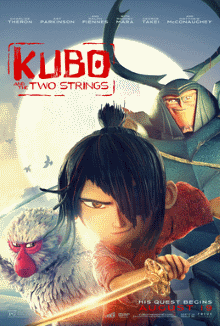
It’s been a while since we’ve actually watched a film in a local cinema. This one was picked because it’s an animated film which always makes my wife happy, it has a stellar Rotten Tomatoes rating and at least one poster on Broken Forum had some nice things to say about it. It also helps that this was made by Laika, the studio that only does stop-motion animation, and was responsible for the impressive Coraline.
Set in a fantasy version of ancient Japan, Kubo’s tale begins with his mother fleeing with him from some terrible calamity. The boy therefore grows up in a cave, where his mother tells him stories of how his father and his men died to help them escape from his grandfather, the Moon King. Due to his heritage, he appears to possess powerful magic of his own, manifesting mostly through the banjo-like shamisen instrument that he plays to animate pieces of paper. He uses this ability to earn a living for the two of them by telling stories enhanced with animated origami models at the nearby village but his mother warns him to always return to the cave before nightfall as his grandfather is constantly searching for him. But if Kubo always kept himself hidden away we wouldn’t have much of a story, and so one day he stays out too late after trying unsuccessfully to commune with the spirit of his deceased father. Under the harsh glare of the full moon, his mother’s two sisters soon locate him and his mother sacrifices herself to stop them. He then has to set off on a quest to recover the three magical items that will be needed to defeat the Moon King.
The film has a promising beginning: the scene in which Kubo’s mother is fleeing is wonderfully atmospheric. His mother’s display of magic is impressively epic, what with those gigantic waves towering over her, while making it clear that she’s still a vulnerable woman. I also like that when the next we see of Kubo after he has grown up a bit, it is he who now has to care for his mother. It’s extremely rare to see an animated film in which the young hero has to deal with a mother who seems to be slowly losing her mind. Unfortunately, once the quest begins, this turns into a generic adventure film and all of these promising details fall by the wayside. It’s not just that his mother conveniently sacrifices herself so that Kubo can strike out on his own without being saddled with this responsibility. He even gets her back in a form that doesn’t suffer from these memory problems. There’s no explanation of what caused the mental lapses in the first place and no acknowledgment from her that she ever suffered from them.
Setting up pieces only to only to completely ignore them later turns out to be a running theme in Kubo and the Two Strings. Since I doubt that anyone cares about spoilers in a film that doesn’t take itself very seriously, I’d like to point out that this even extends to the central quest. Kubo spends the entire film searching for the magical sword, armor and helm because he is repeatedly told that they are the only objects that can defeat his grandfather. Yet during the final confrontation, these treasures appear to be totally useless and Kubo resorts to his own innate magic instead. I could understand if they pulled out some standard homilies like how it’s the experiencing of questing for them that makes him strong enough to face his grandfather, but they don’t even make that attempt. Similarly in the open narration, Kubo dramatically tells the audience to remember every detail of the story and admonishes the audience that if they forget even one detail, the hero will surely perish. He repeats this line a couple more times in the film, so we’re led to expect that something will come of it. Except nothing does, meaning that this film keeps breaking the Chekhov’s gun principle of narrative writing over and over again, making it an incredibly frustrating watch.
The film displays a similar degree of sloppiness with various plot details. The twist that is the identity of Kubo’s father is both stupid and predictable but this revelation instantly invalidates at least a couple of earlier scenes. What the heck caused the origami of Hanzo to animate and why was Monkey shocked by the sight? I did like the Japanese aesthetics of the film but I gradually realized that the borrowing is purely superficial. The story doesn’t feel Japanese in any way, unlike for example Kung Fu Panda which managed to integrate a measure of Chinese philosophy into the heart of its story. The problem becomes worse when you see the credits at the end of the film and how almost all of the names that those of white people. It’s hard to see this as anything other than cultural appropriation as this film feels very much like white people dressing up as Japanese for the fun of it without any real understanding of what they’re doing.
The film’s only saving grace is that the art is top notch and the character designs are fantastic. The aunts who hunt for Kubo in particular look really scary and the giant skeleton gave me a very Dark Souls vibe. I’m also amazed by how much work it must have taken to make this since they’re all real models that must be painstakingly constructed and then physically moved with wires. Overall however, I think this is pretty dumb film that insults the intelligence even of children and the only reason how it could have so high of a rating on Rotten Tomatoes is because the critics are so eager to grasp on to anything that is culturally even a bit more exotic than the norm.